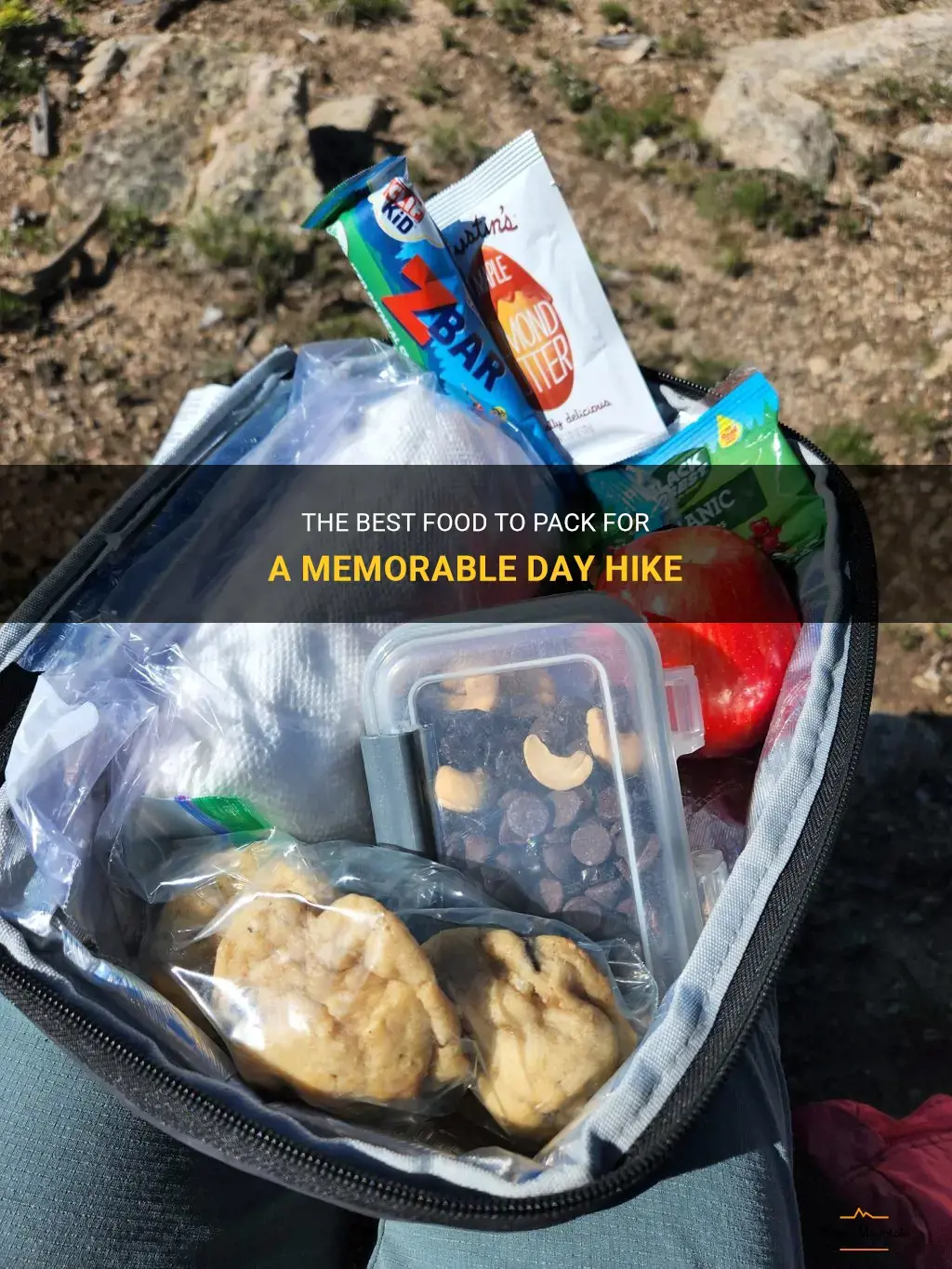
Imagine embarking on a picturesque day hike, surrounded by lush greenery and breathtaking views. As you make your way up the trails and explore nature's wonders, your stomach begins to rumble, reminding you of the importance of fueling your body. But fear not, because today we are here to guide you on the best food to pack for a memorable day hike. Whether you're a seasoned adventurer or a first-time hiker, having nutritious and delicious snacks can make all the difference in elevating your outdoor experience. So let's dive into a world of flavors and discover the perfect foods to nourish your body and create lasting memories on the trail.
| Characteristics | Values |
|---|---|
| Duration | 1 day |
| Distance | Varies depending on the hike |
| Terrain | Varies depending on the hike |
| Weather | Varies depending on the location |
| Water | Sufficient water for the hike |
| Snacks | Lightweight and non-perishable |
| Meals | Easy to prepare and eat on the go |
| Utensils | Lightweight and durable |
| Containers | Sealable and easy to pack |
| Clothing | Layers for changing weather |
| First Aid | Basic first aid kit |
| Navigation | Map and compass |
| Lighting | Headlamp or flashlight |
| Personal items | Sunscreen, bug spray, etc. |
| Backpack | Comfortable and properly fitted |
What You'll Learn
- What are some lightweight, non-perishable food items that are ideal for packing on a day hike?
- Are there any specific foods that are better for sustained energy during a day hike?
- What kind of food storage containers or bags should I use to keep my food fresh and protected during a day hike?
- Are there any dietary restrictions or considerations I should keep in mind when packing food for a day hike?
- How much food should I pack for a day hike?

What are some lightweight, non-perishable food items that are ideal for packing on a day hike?
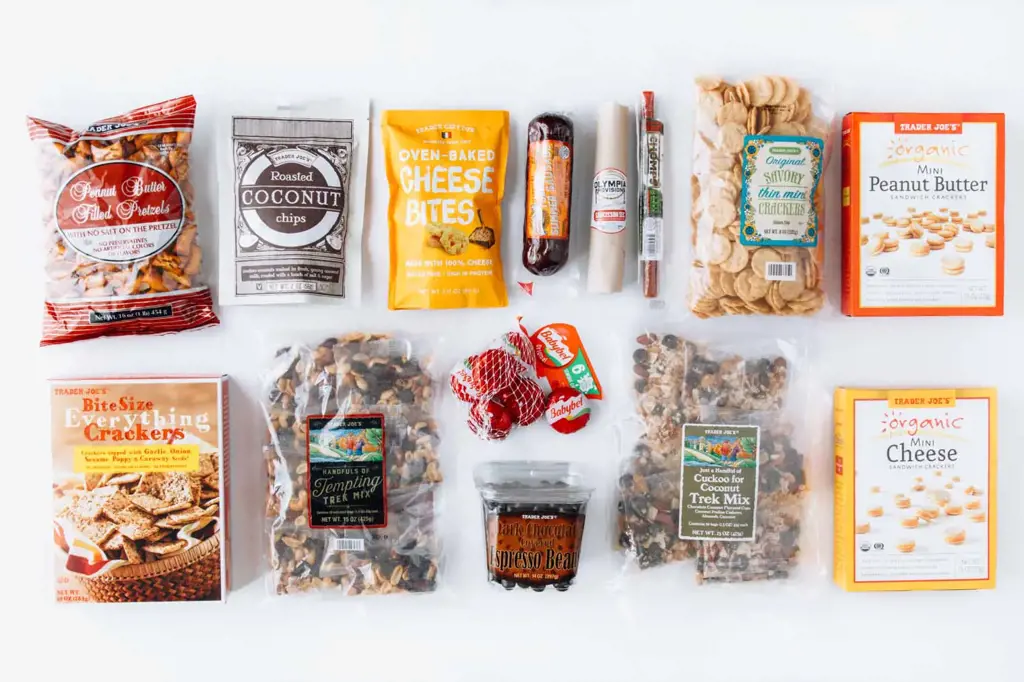
When planning a day hike, it's important to pack the right kind of food to keep you energized and satisfied throughout your adventure. Lightweight, non-perishable food items are the ideal choice as they won't weigh you down and can withstand the rigors of hiking. Here are some recommendations for the best lightweight, non-perishable food items to pack on a day hike:
- Trail Mix: A staple for hikers, trail mix is a perfect combination of nuts, dried fruits, and seeds. It is packed with protein, healthy fats, and carbohydrates, providing you with the energy you need to keep going. Opt for a mix that includes a variety of ingredients to keep things interesting.
- Energy Bars: Energy bars are a quick and convenient source of nutrition. Look for bars that are high in protein and fiber to keep you full and satisfied. Choose bars with natural ingredients and avoid those with excessive sugar content.
- Jerky: Jerky is a great source of protein and is lightweight and easy to pack. Beef, turkey, or even plant-based jerky options are available, providing a variety of flavors to choose from. Make sure to choose low-sodium options to avoid excessive salt intake.
- Dried Fruit: Dried fruit is a delicious and lightweight snack that provides natural sugars, fiber, and vitamins. Options like dried apricots, mangoes, or cranberries are packed with nutrients and can give you a much-needed energy boost during your hike.
- Nut Butter Packets: Single-serving nut butter packets are a great way to add healthy fats and protein to your hiking diet. They are easy to carry and can be squeezed directly into your mouth or spread on crackers or energy bars for a quick and filling snack.
- Crackers or Rice Cakes: Crackers or rice cakes are lightweight and provide carbohydrates for sustained energy. Look for whole grain options to add fiber and nutrients to your snack. Pair them with nut butter or cheese for an extra punch of flavor and protein.
- Instant Oatmeal Packets: Instant oatmeal packets are a great option for a hot and nutritious meal on your hike. Simply add hot water and let it cook while you take a short break. Choose options with added protein and dried fruits to make it more satisfying.
- Cheese: Hard cheese, like cheddar or gouda, is a durable and non-perishable snack that can be enjoyed during a hike. It provides protein and healthy fats, keeping you satisfied for longer periods of time.
- Tuna or Salmon Packets: Single-serving packets of tuna or salmon are an excellent source of protein and omega-3 fatty acids. They can be enjoyed straight from the packet or mixed with crackers or rice cakes for a heartier snack.
- Instant Coffee or Tea Packets: If you're a coffee or tea lover, instant coffee or tea packets are a must-have for your day hike. They provide a quick and easy way to enjoy a warm beverage while taking a break and enjoying the scenery.
Remember to pack enough water to stay hydrated throughout your hike. Non-perishable food items are great, but staying properly hydrated is equally important. With these lightweight, non-perishable food items, you can fuel your body during your day hike without weighing yourself down. Enjoy your hike and happy snacking!
Packing for Disneyland: Essential Tips for a Magical Trip
You may want to see also

Are there any specific foods that are better for sustained energy during a day hike?
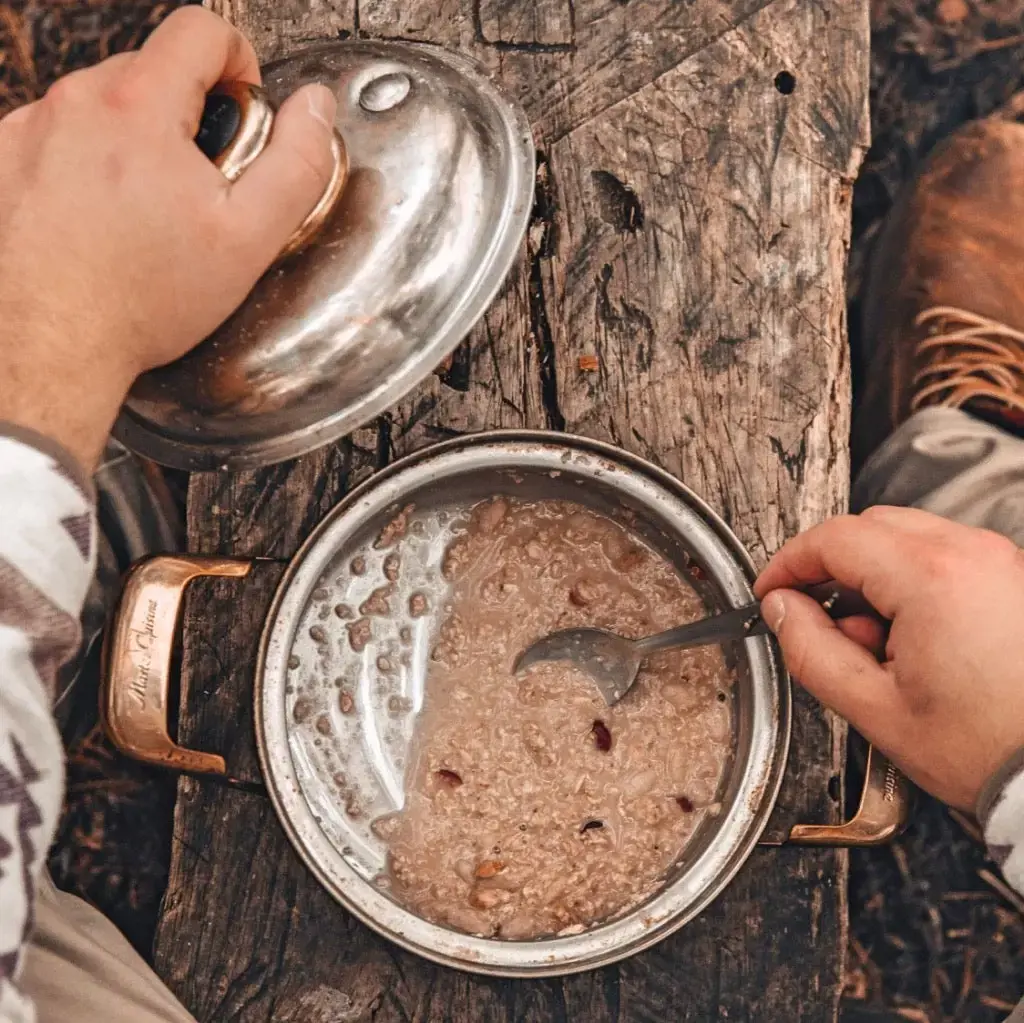
When planning a day hike, it is important to consider the type of foods that will provide sustained energy throughout the journey. The right foods can help keep your energy levels up, prevent fatigue, and enhance your overall hiking experience. Here are some specific foods that are excellent choices for sustained energy during a day hike.
- Complex carbohydrates: Foods rich in complex carbohydrates, such as whole grains, fruits, and vegetables, are excellent sources of energy. These foods break down slowly in the body, providing a steady release of glucose into the bloodstream. This steady release of glucose ensures a continuous supply of energy during your hike. Opt for whole grain bread, oats, quinoa, sweet potatoes, and fruits like bananas and apples.
- Nuts and seeds: Nuts and seeds are packed with healthy fats, protein, and fiber, all of which contribute to sustained energy. They are also convenient to carry and require no refrigeration. Almonds, walnuts, cashews, chia seeds, and flaxseeds are excellent choices. They provide essential nutrients, including omega-3 fatty acids, which can help reduce inflammation and improve endurance.
- Dried fruits: Dried fruits like raisins, dates, apricots, and mangoes are a concentrated source of carbohydrates that can provide a quick energy boost during your hike. They are also rich in fiber, vitamins, and minerals, making them a nutritious choice. However, it is important to consume dried fruits in moderation due to their high sugar content.
- Lean proteins: Including a source of lean protein in your hiking snacks can help maintain energy levels and prevent muscle fatigue. Good options include jerky, chicken or turkey slices, tofu, and Greek yogurt. Protein helps repair and build tissues, making it essential for recovery after physical exertion.
- Electrolyte-rich foods: Electrolytes are essential for maintaining hydration and preventing cramps. Some electrolyte-rich foods that can help replenish your electrolyte levels during a hike include coconut water, celery, cucumber, and watermelon. These foods are also hydrating and refreshing, making them a great choice for hot weather hikes.
- Energy bars or gels: When hiking, it can be convenient to carry some energy bars or gels, which are specifically designed to provide a quick source of fuel. Look for bars or gels that contain a good balance of carbohydrates, protein, and healthy fats. Avoid bars high in added sugars, as they can cause a spike in blood sugar levels followed by a crash.
Remember to stay hydrated by drinking plenty of water throughout your hike. Hydration is crucial for maintaining energy levels and preventing dehydration. Additionally, avoid foods high in added sugars or saturated fats, as they can lead to energy crashes and leave you feeling sluggish.
In conclusion, selecting the right foods for sustained energy during a day hike is essential for an enjoyable and successful outing. Choose complex carbohydrates, nuts and seeds, dried fruits, lean proteins, electrolyte-rich foods, and energy bars or gels that provide a good balance of nutrients. With the right nutrition, your body will have the fuel it needs to keep you energized and ready to take on the trails.
The Ultimate Guide: Packing Essentials for Distance Hiking
You may want to see also

What kind of food storage containers or bags should I use to keep my food fresh and protected during a day hike?
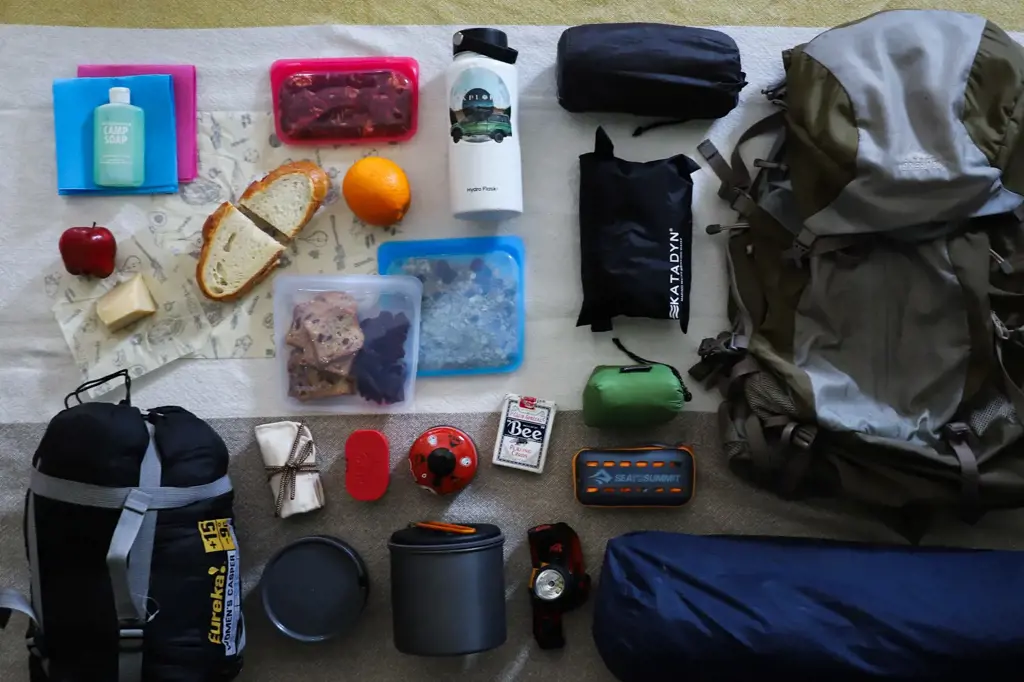
When going on a day hike, it's important to have proper food storage containers or bags to keep your food fresh and protected. The type of containers you choose will depend on the length of your hike and the types of food you plan to bring. Here are some tips to help you choose the right food storage containers for your day hike.
- Choose containers that are lightweight and durable. Look for containers made of materials like lightweight plastic or stainless steel that can withstand the rough conditions of a hike. Avoid glass containers, as they can be heavy and break easily.
- Opt for containers with secure lids. Make sure the containers you choose have tight-fitting lids to prevent any leaks or spills. This will help keep your food fresh and protect it from the elements.
- Consider using resealable bags for snacks. For small items like trail mix, granola bars, or dried fruit, resealable bags can be a convenient option. They take up less space in your backpack and are easy to open and close.
- Use insulated containers for perishable items. If you're planning to bring perishable items like sandwiches or cut fruits, it's a good idea to invest in insulated containers. These containers will help keep your food cool and prevent spoilage.
- Pack your food in portion-sized containers. Instead of bringing large containers of food, consider packing your meals in smaller, portion-sized containers. This will make it easier to access your food during the hike and will help prevent any leftovers from going to waste.
- Use a cooler bag for longer hikes. If you're planning a longer hike and need to keep your food cool for an extended period of time, a cooler bag can be a great option. Look for a bag that is insulated and has a waterproof lining to keep your food protected from the elements.
- Consider using vacuum seal bags. Vacuum seal bags can be a great option for keeping perishable items fresh for longer periods of time. They remove all the air from the bag, which helps prevent oxidation and spoilage.
In conclusion, choosing the right food storage containers for your day hike is essential to keeping your food fresh and protected. Consider the length of your hike, the types of food you plan to bring, and any specific storage needs you may have. With the right containers, you can enjoy delicious meals and snacks while enjoying the great outdoors.
Exploring Your Options: Which Pack to Buy in Conan Exiles
You may want to see also

Are there any dietary restrictions or considerations I should keep in mind when packing food for a day hike?
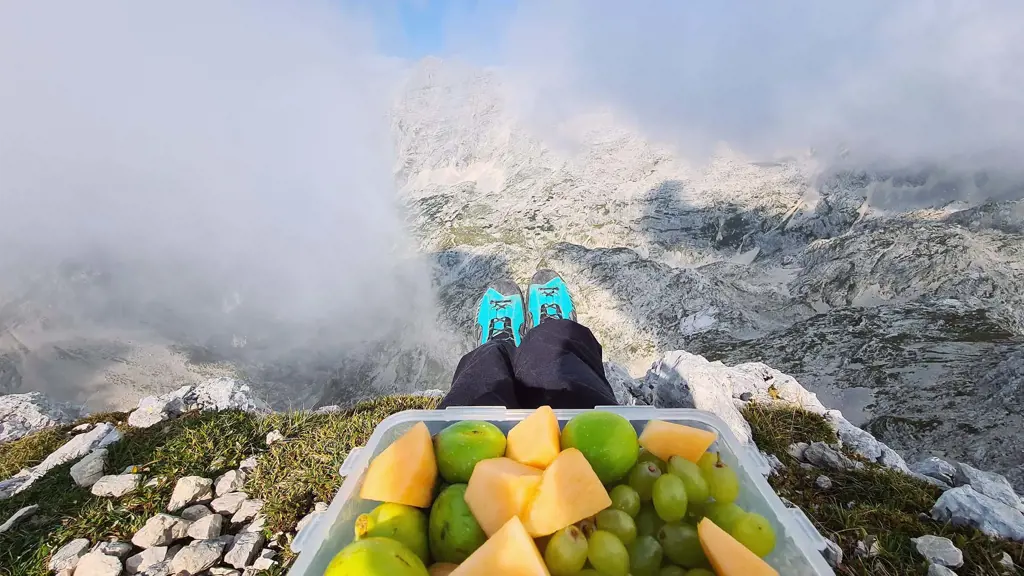
When planning for a day hike, it is important to consider any dietary restrictions or considerations that you or your hiking companions may have. Proper nutrition and hydration are crucial for a successful hike, and taking the time to pack appropriate food can make all the difference. Here are some guidelines to keep in mind:
- Consider allergies and food intolerances: If you or anyone in your group has allergies or food intolerances, it is essential to pack foods that are safe for consumption. Common allergens to watch out for include peanuts, tree nuts, gluten, dairy, and shellfish. Opt for pre-packaged snacks that are labeled allergen-free to avoid any potential reactions.
- Pack high-energy foods: Hiking requires a lot of physical exertion, so it is important to fuel your body with foods that provide sustained energy. Choose snacks that are rich in carbohydrates, such as granola bars, energy bars, or trail mix. These foods can provide a quick energy boost and keep you going throughout the day.
- Include protein-rich foods: Protein is essential for muscle repair and recovery, so it is important to include protein-rich foods in your hiking snacks. Pack items like jerky, nuts, or protein bars to ensure that you are getting the necessary nutrients to support your physical activity.
- Don't forget about hydration: Proper hydration is key while hiking, so be sure to pack plenty of water. Consider using a hydration bladder or water bottles that are easy to carry. You can also bring along electrolyte-rich drinks or add electrolyte tablets to your water to replenish lost minerals.
- Consider the weather: The weather conditions can affect the types of foods you pack for your hike. In hotter climates, it is important to choose foods that can withstand the heat and won't spoil easily. Opt for items like dried fruit, beef jerky, or crackers that won't melt or spoil in the heat. In colder weather, pack foods that are easy to eat and won't freeze, such as energy bars or sandwiches.
- Pack for convenience: When hiking, it's important to choose foods that are easy to eat on the go. Avoid packing foods that require elaborate preparation or utensils. Instead, choose items that can be eaten with your hands, such as sandwiches, protein bars, or fruit.
Examples of a well-rounded hiking lunch could include a turkey sandwich on whole wheat bread, a granola bar, a piece of fruit, and a bottle of water. This combination provides carbohydrates from the bread and granola bar, protein from the turkey, and hydration from the water.
In conclusion, being mindful of dietary restrictions and considerations is crucial when packing food for a day hike. Plan ahead, pack high-energy and protein-rich foods, consider the weather conditions, and choose foods that are convenient and easy to eat. By doing so, you can ensure that you have the necessary fuel to tackle your hike and enjoy a successful day outdoors.
Create the Perfect Itinerary: Your Invitation and Packing Guide
You may want to see also

How much food should I pack for a day hike?
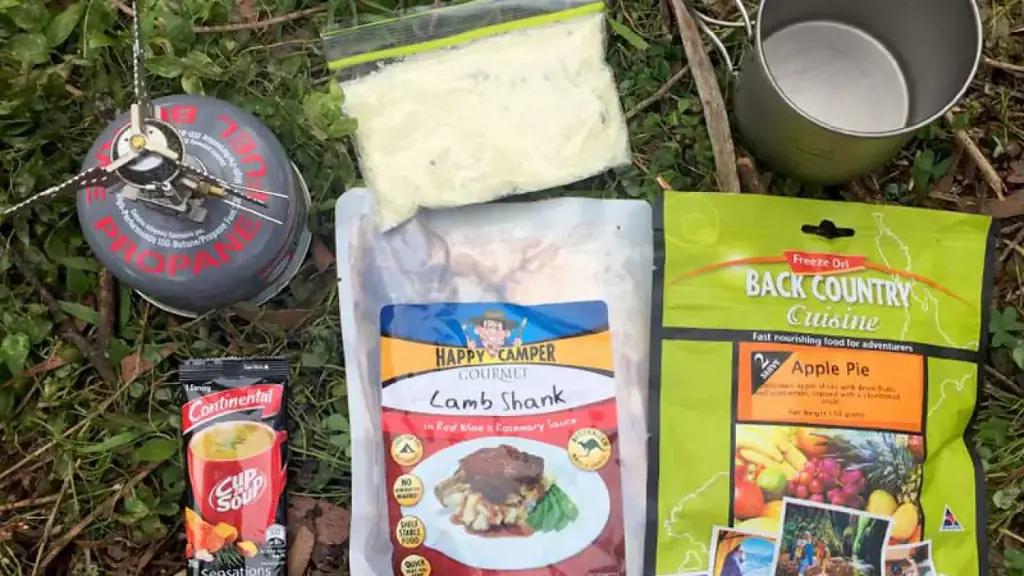
When planning a day hike, food is an essential consideration. Packing the right amount of food will ensure that you have enough energy to complete your hike and enjoy the experience. But how much food should you pack for a day hike? In this article, we will discuss the factors to consider and provide some guidelines to help you plan your meals for a day hike.
Factors to Consider
Several factors will determine how much food you should pack for a day hike:
- Duration of the hike: The length of your hike will determine how many meals and snacks you need to pack. For shorter hikes, one or two meals might be sufficient, while longer hikes may require additional meals and more snacks.
- Intensity of the hike: The difficulty level of your hike will affect your energy expenditure. If you're planning a strenuous hike, you will burn more calories and will need to pack more food to replenish your energy levels.
- Personal dietary needs: Consider your personal dietary needs and preferences when planning your meals. It's important to pack food that you enjoy eating and that meets your nutritional requirements.
Guidelines for Packing Food
To ensure you have enough food for your day hike, follow these guidelines:
- Calculate your calorie needs: Estimate your caloric needs based on your weight, age, and activity level. This will give you a rough idea of how many calories you need to consume throughout the day. On average, hikers burn around 300-600 calories per hour.
- Choose nutrient-dense foods: Opt for foods that are lightweight, compact, and provide a good balance of carbohydrates, protein, and fat. Some examples include energy bars, trail mix, dried fruit, nuts, jerky, and sandwiches.
- Pack enough meals and snacks: As a general rule, pack one main meal for every 4-5 hours of hiking. This could be a sandwich, wrap, or a dehydrated meal. Additionally, pack 2-3 small snacks, such as energy bars or trail mix, to keep you fueled between meals.
- Consider the weather conditions: In hot weather, you may need to pack additional electrolyte-rich snacks, such as sports drinks or electrolyte tablets, to replace the minerals lost through sweat.
- Don't forget hydration: Remember to pack enough water to stay hydrated throughout the hike. It's recommended to carry at least 2 liters of water per person, depending on the length and intensity of the hike.
Example Meal Plan
Here's an example meal plan for a day hike:
- Breakfast: Before starting your hike, have a balanced meal that includes carbohydrates, protein, and some healthy fats, such as oatmeal with nuts and a banana.
- Mid-morning snack: Pack an energy bar or trail mix to keep you fueled during the first part of your hike.
- Lunch: For lunch, pack a sandwich with lean protein (e.g., turkey or chicken), whole grain bread, and plenty of veggies. Alternatively, bring a dehydrated backpacking meal that can be easily prepared on the trail.
- Afternoon snacks: Pack additional snacks like dried fruit, nuts, or jerky to keep your energy levels up.
- Hydration: Drink water throughout the hike to stay hydrated. If you prefer flavored beverages, you can also pack electrolyte-rich sports drinks.
- Post-hike meal: After completing your hike, it's important to refuel. Consider packing a high-protein snack, such as a protein bar or shake, to aid in muscle recovery.
Remember to adjust the quantities of food based on your personal needs, the intensity of your hike, and the duration of your trip.
In conclusion, packing enough food for a day hike requires considering factors such as the hike's duration, intensity, and your personal dietary needs. Following these guidelines and planning your meals in advance will ensure you have enough energy to enjoy your day hike. Don't forget to stay hydrated and pack lightweight, nutrient-dense foods that you enjoy. Happy hiking!
The Essential Clothing Items to Pack for Your Newborn Baby in the Hospital
You may want to see also
Frequently asked questions
When packing food for a day hike, it's important to choose items that are lightweight, non-perishable, and easy to eat on the go. Some popular options include energy bars, trail mix, jerky, and pre-packaged sandwiches or wraps. Fresh fruit, such as apples or oranges, can also be a refreshing and energizing snack. Don't forget to pack plenty of water or other hydrating beverages as well.
The amount of food you should pack for a day hike depends on factors such as the length and intensity of the hike, as well as your personal appetite. As a general rule, it's best to pack enough food to fuel your body and keep you satisfied throughout the hike. This typically includes at least one main meal, such as a sandwich or wrap, as well as several smaller snacks to eat along the way. It's always better to pack a little extra than to run out of food, so consider bringing a few extra energy bars or trail mix packets just in case.
Yes, there are a few special considerations to keep in mind when packing food for a day hike. First, it's important to choose items that won't spoil or become squished easily. Avoid packing foods that require refrigeration or delicate items that may get crushed in your backpack. Additionally, it's a good idea to pack foods that provide a balance of nutrients, including carbohydrates for energy, protein for muscle repair, and healthy fats for sustained energy. Finally, be mindful of any dietary restrictions or allergies you or your hiking companions may have, and pack food accordingly.







